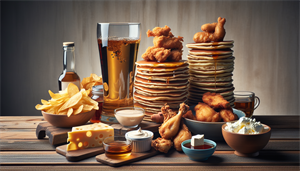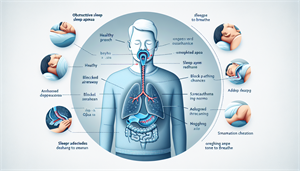
Discover What Foods Cause Sleep Apnea: Dietary Culprits to Watch Out For
Have you ever thought about the connection between your diet and your sleep? It’s not something we often consider, but what we eat can significantly impact our sleep quality - especially for those of us dealing with sleep apnea.
While changing your diet won’t cure sleep apnea, knowing what foods cause sleep apnea can significantly affect the severity and frequency of symptoms, making it a crucial part of managing the condition.
Key Takeaways
-
Foods high in saturated fats, like fatty meats and high-fat dairy products, as well as sugary and processed foods, can worsen sleep apnea symptoms due to their contribution to inflammation and obesity.
-
Alcohol, caffeine, and other inflammatory foods have a detrimental effect on sleep quality and may exacerbate sleep apnea symptoms by inducing throat muscle relaxation and disrupting sleep patterns.
-
A combined approach of a healthy diet rich in melatonin, omega-3, and tryptophan, alongside regular exercise and medical interventions like CPAP therapy, can effectively manage and improve sleep apnea symptoms.
Foods that Trigger Sleep Apnea
It’s not widely known that certain foods can trigger sleep apnea symptoms. Consuming fatty meats, high-fat dairy products, and sugary processed foods can worsen the symptoms of this sleep disorder, impacting your sleep quality.
So, if you’re struggling with sleep apnea, it might be time to reconsider your food choices. You may significantly improve your sleep quality by steering clear of these problematic foods.
Of course, it’s not just about what you shouldn’t eat. It’s also about understanding why these foods can be problematic and finding healthy, tasty alternatives. We will delve into these dietary culprits, highlighting why they are troublesome for sleep apnea sufferers.
Fatty Meats
While fatty meats might be tempting, they are not the most suitable choice for those battling sleep apnea. These high saturated fat foods can lead to increased inflammation and contribute to cardiovascular issues, which have been associated with an increased risk of sleep apnea.
Some examples of fatty meats to avoid include: Burgers, Steaks, Pork, Bacon, Sausages. Consuming fatty meats, which are considered as fatty foods, can elevate cholesterol levels and increase the risk of heart disease.
What’s the alternative? A Mediterranean diet, which is low in red meat and high in fruits, vegetables, and healthy fats, may be a better option for individuals with sleep apnea. This heart-healthy diet can help you manage your weight, reduce inflammation, and improve your overall health - all of which can help manage sleep apnea symptoms.
High-Fat Dairy Products
High-fat dairy products, another trigger for sleep apnea, can potentially increase mucus production, making it more difficult to breathe during sleep. If you’ve ever experienced a sore or itchy throat, persistent urge to cough, or increased drainage, it could be a sign of increased mucus production due to high-fat dairy consumption. To manage your symptoms, consider switching to low-fat dairy options or plant-based alternatives.
Sugary and Processed Foods
Furthermore, sugary and processed foods can induce inflammation in the body, possibly worsening sleep apnea symptoms. High-glycemic foods, characterized by high levels of processed sugars, can lead to rapid increases in blood glucose levels, contributing to obesity - a known risk factor for sleep apnea. Some examples of high-glycemic foods to avoid include: Soda, Candy, Pastries, White bread, White rice.
By reducing your intake of these foods, you may be able to lose weight, improve your sleep apnea symptoms, and overall health. Avoiding these inflammatory foods, such as processed, fried, and sugary foods, can help manage your symptoms and prevent unwanted weight gain. Instead, try choosing whole grains over enriched grains.


